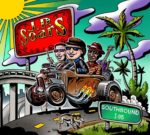 I-95; almost two thousand miles from Maine to Florida, if you’re Southbound like J.P. Soars. Not as well known as Route 66, but here’s a coincidence; I’m reading a guitar player’s memoir at the moment (next review up) which references I-95 extensively. And Southbound? Well that’s heading towards Florida and who wouldn’t, particularly in the winter? The title song’s a road song, plain and simple, in the age-old tradition; it’s the story of touring musicians, road dogs, and it’s the most straight-up, no-nonsense song on the album. No matter how sophisticated your tastes and influences get, it’s always fun to throw in a few loud riffs and fills
I-95; almost two thousand miles from Maine to Florida, if you’re Southbound like J.P. Soars. Not as well known as Route 66, but here’s a coincidence; I’m reading a guitar player’s memoir at the moment (next review up) which references I-95 extensively. And Southbound? Well that’s heading towards Florida and who wouldn’t, particularly in the winter? The title song’s a road song, plain and simple, in the age-old tradition; it’s the story of touring musicians, road dogs, and it’s the most straight-up, no-nonsense song on the album. No matter how sophisticated your tastes and influences get, it’s always fun to throw in a few loud riffs and fills
J.P. Soars is no average blues player. Great players don’t allow themselves to be defined by one genre; blues/rock might be at the centre of “Southbound I-95” but it doesn’t define it. And before we move on, there are fifteen songs on the album, but the funky “Sure as Hell Ain’t Foolin’ Me” crops up in ‘explicit’ and ‘clean’ versions (‘bullshit’ becomes ‘BS’) and “Arkansas Porch Party” reappears as the muted background for a hidden track.
If you’re this good, you don’t just keep recycling the same old licks; you keep moving on and soaking up more and more esoteric influences which then resurface in your work. You might do the Albert King and Muddy Waters covers (and J.P. does “When You Walk Out that Door” “Deep Down in Florida” with style and conviction) but there’s a lot more to it than that. Some of the stylings are fairly standard; “Southbound I-95” opens with a surf-punk guitar sound (think Dick Dale meets Link Wray, “Shining Through the Dark” is sixties pop-soul with a hint of “Hey Baby” while “The Grass Ain’t Always Greener” channels “Great Balls of Fire” and the Gary Bonds stomper “New Orleans”.
Things get a bit more esoteric with the mariachi horns adorning “Deep Down in Florida”, the surf meets Perez Prado sound of “Across the Desert” and the strangeness that is “Troubled Waters” which opens like Lynyrd Skynyrd before morphing into an Eastern-influenced instrumental breakdown with a banjo taking the sitar part and back into Southern rock again.
In a world where the hopes of megastardom as a blues/rock player are minimal (apparently there’s only room for one Joe Bonamassa at any given time) and you have talent to burn like J.P Soars, then you just have to follow your vision and go where it leads you. On the whole, this is a hugely entertaining album; it sounds like everyone’s having a great time and the playing is phenomenal – give it a listen.
Release date Friday March 8th .
And enjoy this:
There was a time earlier this year, when I was hobbling around with the help of a crutch, when I thought that I would have difficulty scraping together five gigs that I’d actually seen; how wrong was that? It’s been difficult to narrow this list down to five, so I think there might be a few honourable mentions as well. So, in absolutely no order at all are my favourite live shows of 2014.
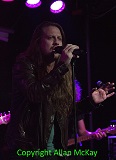 Jim Stapley Band at 93 Feet East
Jim Stapley Band at 93 Feet East
Jim Stapley’s debut album almost made my top five albums, but there was absolutely no doubt about this live performance. Jim has a phenomenal soulful rock voice and he has pulled together a superb band to deliver the songs live. This was an album launch gig featuring virtually all of the album “Long Time Coming” (plus a cheeky cover of Rihanna’s “We Found Love”) and, despite atrocious weather and a half-full venue, Jim and the band gave it everything. The songs were strong, the band were cooking on gas, but what a voice.
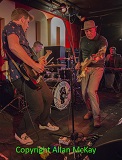 Stone Foundation at The 100 Club
Stone Foundation at The 100 Club
Towards the end of a very busy year for the band, this was an appearance at the annual Delicious Junction bash and another headline slot at The 100 Club with a set based solidly on the “To Find the Spirit”. All of the band members are great players but, despite the solos, this isn’t about individuals, it’s about the group; it’s the perfect combination of a locked-in rhythm section, keyboards and horns. It was also a chance to see how the new members Gareth John (trumpet and flugelhorn) and Rob Newton (congas) had bedded in. It’s fair to say that the horns sounded better than ever and the congas added a little bit of icing on the cake. It was a great set from the band and a stomping encore of “Jumping Jack Flash”. Enough said.
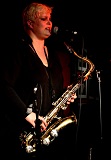 Little Devils at The 100 Club
Little Devils at The 100 Club
Yeah, The 100 Club again and it’s blues Jim, but not as we know it; Little Devils are fronted by singer and multi-instrumentalist (sax and flute), Yoka. The rhythm section of Graeme Wheatley and Sara-Leigh Shaw (aka the Pintsized Powerhouse) built a solid base for Big Ray’s guitar and Yoka’s vocals and instrumental solos. The quality of the playing alone would put this gig up there with the best this year but this is also great fun; the band obviously enjoy themselves and the audience will always pick up on that. Great performances and big smiles all around the room; that’s a pretty good combination for a great night.
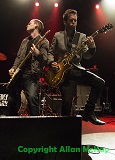 Federal Charm and Ian Hunter’s Rant Band
Federal Charm and Ian Hunter’s Rant Band
This was the final night of the Ian Hunter tour and the audience was in a party mood. It’s not the first time I’ve seen Federal Charm but they seem to get better every time. They got a huge cheer when they strolled on to the Shepherds Bush Empire stage and powered their way through thirty minutes of melodic blues rock featuring their powerful cover of “Reconsider” before making way for Ian Hunter. What a legend; played for two hours and kept the audience spellbound throughout, and the voice still sounds great. We even got an appearance from Mick Ralphs for the encore. Top night.
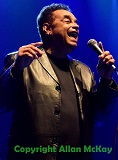 Gary Bonds, Southside Johnny and The Asbury Jukes
Gary Bonds, Southside Johnny and The Asbury Jukes
Now this sounded like a great idea. 60s legend, and big influence on the Asbury Park scene teams up with Southside Johnny for a UK tour; I’ll even pay for tickets for that. Albany Down, despite a ten-second soundcheck, got the audience nicely warmed up for the main event which was a set from Gary Bonds (with some help from Southside) and a set from Southside (with a little help from Gary Bonds), both backed The Asbury Jukes. As ever, the superb musicians (Jeff Kazee, Tom Seguso, John Conte, Glenn Alexander, John Isley, Chris Anderson and Neal Pawley) fitted together perfectly and reacted instantly to any curveballs thrown by Southside. Seriously great players but they know how to have a bit of fun as well. They’re a great attraction as The Jukes, but Gary Bonds just tipped it over the edge.
It was incredibly difficult to narrow this down to only five gigs and there are a few more which deserve honourable mentions. I saw Vera Lynch three times (including their final gig at The Barfly in Camden and a gig in a Shoreditch shop window), The Kennedys and Edwina Hayes at Green Note and Dean Owens and Black Scarr on Eel Pie Island and all of those were great nights. Here’s to many more in 2015.
Last Friday I had the opportunity to spend some time with the legendary Southside Johnny before the final show of his UK tour, featuring Gary “US” Bonds, at Shepherds Bush Empire. He was entertaining and engaging (as always):
AM – We did an interview here three and a half years ago and at that time you spoke to me about this acoustic thing that you might or might not be doing, which was really big news at the time and that’s happened now, so how’s that going?
SJ – It’s really good, it’s a fun thing. It’s really stripped down; we travel in a van together, we have breakfast in the morning as a band (there’s only six of us, with the road manager) and we set up our own equipment and tear it down and it really feels like the old days when you used to have to do that. It was a complete commitment to the whole day of travel, set up, play, tear down and travel again and even though I’m kinda long in the tooth I really enjoy it because it seems so organic and basic; there’s no star turns at all. I love playing acoustic music and it gives us a chance to play George Jones and Emmylou Harris and Bob Dylan and Tom Waits and some Bruce in a different format.
AM – You mentioned a few country artists there; you’ve always been a country fan haven’t you?
SJ – Yes I liked country when I was very young. What I didn’t know is that my mother, way back in the thirties when the ukulele was the big thing, she bought a ukulele from Sears Roebuck and she would sit on the porch with her father (her mother had died young) and some neighbours, and they would sing country songs, so I guess it’s in my blood, it’s the Irish part of me.
AM – I’ve heard you play “He’ll Have to Go” (country classic made popular by Jim Reeves) at The Astoria, I think.
SJ – Well, Soozie Tyrell, who plays violin with Bruce, she has a country band in New York City, and I would go up and do lots of songs with her because they’re real singer’s songs, they’re story songs with great melodies so it’s fun to make that kind of music.
AM – The old Jukes revolving door seems to have slowed down a little…
SJ – Not too much. We’ve got a new saxophone player, John Isley; I think (drummer)Tom Seguso’s been over here.
AM – At the time of the last interview, Joey (Stann, tenor sax) and Ed (Manion, baritone sax) were still with you but they’re obviously off doing other things now. There seems to be lots of side projects going on as well now that the New York Horns have made a record.
SJ – These days it’s a lot easier to make a record for a little money and it’s also easier to manufacture; for a buck apiece you can make as many CDs as you want and there’s a profit margin once you’ve paid for the studio time and the musicians and all the rest of it. I’m lucky that Jon Bon Jovi lets me use his studio but, even if he didn’t, studio time’s not as expensive as it used to be, home recording’s easier and the internet makes it easy to get distribution to all your fans round the world. It’s a good time to be a musician because you can do all the little things you want to do without incurring great expense.
AM – Did the side projects always happen to a certain extent; do we just hear about them more because of social media?
SJ – We’ve always done those things; Bobby (Bandiera, guitar, now playing with Bon Jovi) and I went out for months, here and there, doing a lot of charity gigs and they put us on a plane, in business class, just him and me and a guitar and harmonicas. We went all over and played charity things and it was just a chance to play in hotels and every little place you could find and it was a lot of fun because it was no stress.
AM – I saw you at Sheffield City Hall in 1995, I think, just the two of you doing the stripped back thing and it was a great night.
SJ – Well, if you have confidence in what you’re doing and you have material you think you can accomplish with just a guitar and a harmonica it’s a chance to explore all that too. Years ago Bobby, Rusty Cloud, David Hayes and I played in Paris at the Chesterfield Club. We did a two-week stint there with very little publicity and we rode the Métro and that was a lot of fun too. We all stayed in the same hotel, this funky little place and it was two weeks in Paris. I’m lucky I’ve had the chance to do those things and just explore what making music means other than pedal-to-the-metal trying to earn a living. I can do just about anything I want now. I’m never going to be rich, I’ve known that from the very beginning so there’s not a great stress to be a big star and make a lot of money; I make a living and that’s all I want. I just want to be allowed to do whatever kind of music I want to make.
AM – I was going through some of my very old Jukes records today and it struck me that after Billy Rush left, you got much more involved in the songwriting process; there’s not a lot of your songs on the early albums.
SJ – I was a writer back then but I would write certain things with certain people but the bulk of the song would be theirs and I’d say “forget it, I don’t want to have anything to do with it”. I wrote with Billy but I don’t have the kind of ego that I need to see my name on the album, but now with Jeff and Bobby the songwriting is really a collaboration so I get to write a lot of lyrics that I find interesting like “Into the Harbour” and “Winter in Yellowknife” and stuff like that which is not the norm for romantic love songs.
AM – On “Pills and Ammo”, it struck me that your name’s on every track as a writer. Do you have a certain way of working; do you do the lyrics and Jeff does the music?
SJ – It’s pretty much that way except that if I come up with a musical idea we’ll explore it and he helps me with lyrics; it’s a real collaboration in other words. I’ll come with an idea, a whole lyric and I’ll say “I think it sounds like this” and he’ll find a way to make it sound like what I want, but then he’ll say “what about this…” and we really try to bounce ideas off each other.
AM – I know Jeff’s a big fan of Squeeze and Difford and Tilbrook wrote in that way as well.
SJ – I’m a big Squeeze fan too.
AM – About your audiences; you’ve retained a very loyal audience in the UK. In the US, are the audiences different?
SJ – Well, they speak English. There’s people who come and see us a million times and there’s people who come and see us for the first time and usually we can win people over. It’s the energy and a lot of the music is made to lift you up so it’s not some shoegazer and it’s not some egomaniac, it’s really just music. I think one of the things that keeps people coming back is that it’s never the same night after night and I don’t know where it’s going to go and tonight’s going to be like that too because we’ve got Gary Bonds and we know what we’re going to do but when we get on stage, that may change.
AM – I’ve been watching Billy Walton live for a while and I’ve noticed that his crowd seems to be getting younger. I’ve seen teenagers at his shows but I’ve also seen people in their twenties who know all of the songs. I just wondered if that was happening with The Jukes.
SJ – We do get a lot of younger people; we had a bunch last night in Holmfirth, but we have our loyal fans and they’re the ones that usually get the first tickets and they’re older, but they bring their kids and some of them bring their grand-kids but anybody who’s willing to give us a shot we’re willing to play for as long as they come and have a good time and just enjoy themselves.
AM – November used to be the traditional time for a Jukes tour but the last couple of years you’ve been over during the summer. I’m guessing that’s because of festivals.
SJ – Yes. This year especially, because we had the Cornbury Festival to start it and we’re ending with Bospop in Holland so we had two festivals and we put a bunch of gigs in between and those get to be the anchor gigs. Unfortunately there’s new taxes in England, Foreigner Entertainer Tax (FET) and Hood, who settles everything got hit with it the other night and they wanted £1,400 for FET. Nobody knew exactly what it was but it’s legitimate and all that does is it makes it harder for bands like me to come over here; you can only lose so much money. On the one hand I guess they need the tax money but if they really need that, they should get all those people who hide their money offshore and let us poor bands try to play a little music.
AM – And a lot of musicians are hiding money offshore.
SJ – Well I’m not hiding any money; my money comes and goes and I get to see it as it goes past and that’s about it.
AM – Going back to the festivals, what’s the biggest gig you’ve ever played?
SJ – Probably Knebworth with Led Zeppelin. We did two shows; we did the first one, flew home and did a show in Washington DC, flew back and did the second show at Knebworth and flew home again, if I remember rightly, so it was a lot of flights. And we played about forty minutes but it was fun, it was a unique experience and we met some good people over here.
AM – As far as I can remember, and I was a long way away from the stage, it seemed like you got a pretty good response that day.
SJ – It seemed like that; of course we didn’t the full power that the headline act got (we don’t do that, if somebody opens up for us they get full power, but I’m not ever worried about a band opening up for us, I hope they do well). But I thought Led Zeppelin was terrible; there was no bass in the mix in the audience.
AM – That’s all the serious stuff but I’ve got couple of other questions for you. You’ve now got a huge body of work to choose from when you play; is there anything you feel can’t be left out?
SJ – Well, there’s nothing that can’t be left out, but I’m not there to just indulge myself, I’m there to give people what they want too and you split the difference. I know they want to hear “I Don’t Want to Go Home” and “The Fever” and “Trapped Again” or “Talk to Me” or “This Time It’s for Real” or “Love on the Wrong Side of Town” or whatever and you try to include those but when you twenty-two, twenty-three songs, there’s plenty of room for you to do what you want too. There are times when I say “I’m sick of this song, I’m not doing it” and it lasts for few months then it’s back in.
AM – Here’s one from my sister, who’s a big fan. Is there a song that makes you cry?
SJ – There’s a lot I guess. I’ve got some that I’ve written but Alison Krauss does a song called “I Can Let Go Now” which I think was written by Michael McDonald and it just kills me because I relate it to my mother. I don’t think that’s what it’s really about but for me it is and I just can’t listen to that song. There’s a lot; there are things that really touch me. I wouldn’t be doing if I didn’t get emotionally involved. When I was young and heard certain songs, I either got happy or excited or even felt sexy or touched, and to be part of that tradition is an amazing thing, but I’ve never really lost the idea that if someone sings a great song and really means it then I can get lost in the emotion.
AM – I find it really difficult to listen to “Many Rivers to Cross” after the version Jeff did here in 2010.
SJ – He really puts his heart and soul into it.
AM – Finally, hoping for another scoop, have you get anything in the pipeline?
SJ – Well, Jeff and I have written most of the songs for the next Jukes album; when we get it finished, I don’t know. We’re hoping to get in the studio, perhaps this winter and get it out some time next year. I’d love to get it out by Christmas but that’s just not gonna happen, and I’ve written some songs for a new Poor Fools acoustic thing and I’ve got a couple of other projects in mind too. I could retire if I wanted to, but then what would I do? I’d sit around the house, get fat and drink myself to death, and I can do that on the road.
AM – Johnny, many thanks for making the time for the interview.
SJ – My pleasure, any time.
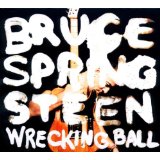 You have to wonder what was in Jon Landau’s mind when he made this statement in a 1974 article in The Real Paper: “I saw rock and roll’s future, and its name is Bruce Springsteen. And on a night when I needed to feel young, he made me feel like I was hearing music for the very first time.” At that time Bruce had released two critically-acclaimed but commercially unsuccessful albums (“Greetings from Asbury Park, N.J.” and “The Wild, the Innocent and the E Street Shuffle”) and “Born to Run” was just a twinkle in his eye; either Jon Landau was incredibly prescient or he made a very lucky guess. Whichever way you look at it, surely even Landau wouldn’t have predicted that The Boss would still be playing stadia and arenas forty years later. The band on Springsteen’s “Wrecking Ball” tour, now in its second year, includes five musicians (Max Weinberg, Gary Tallent, Roy Bittan, Steve van Zandt and The Boss himself) from the “Born to Run” album which was released in August 1975. However unlikely it is, that’s why I’m in the Olympic Park in Stratford to watch the E Street Band for the first time as part of the Hard Rock Calling festival on a rare sunny summer day in London.
You have to wonder what was in Jon Landau’s mind when he made this statement in a 1974 article in The Real Paper: “I saw rock and roll’s future, and its name is Bruce Springsteen. And on a night when I needed to feel young, he made me feel like I was hearing music for the very first time.” At that time Bruce had released two critically-acclaimed but commercially unsuccessful albums (“Greetings from Asbury Park, N.J.” and “The Wild, the Innocent and the E Street Shuffle”) and “Born to Run” was just a twinkle in his eye; either Jon Landau was incredibly prescient or he made a very lucky guess. Whichever way you look at it, surely even Landau wouldn’t have predicted that The Boss would still be playing stadia and arenas forty years later. The band on Springsteen’s “Wrecking Ball” tour, now in its second year, includes five musicians (Max Weinberg, Gary Tallent, Roy Bittan, Steve van Zandt and The Boss himself) from the “Born to Run” album which was released in August 1975. However unlikely it is, that’s why I’m in the Olympic Park in Stratford to watch the E Street Band for the first time as part of the Hard Rock Calling festival on a rare sunny summer day in London.
The Boss is one of those artists I’ve loved since the very early days but always avoided seeing live. I know this sounds weird but there are artists whose work I love so much I didn’t want to see them live and possibly be disappointed. You have to admit there’s a kind of twisted logic to it. Anyway, call it the bucket list if you like but I finally saw sense this year and decided to go to the Hard Rock Calling gig.
The support line-up of the Zac Brown Band (great country music throwing in “Kashmir” and “The Devil Went Down to Georgia” towards the end of the set), Alabama Shakes and Black Crowes who dropped a Georgia medley of “Hard to Handle” and the wonderful Joe South song “Hush”. And then it was time for the The Boss.
The E Street Band hit the stage slightly early with a high-powered version of the “Wrecking Ball” song “Shackled and Drawn” which slid straight in to “Badlands” and the audience were hooked from the start. As usual, Bruce picked request placards from the audience, walked back up to the stage, showed the band the card and immediately launched into the song. The first song to get this treatment was “Johnny 99”, transformed from the stripped-back album original to a full-on band arrangement with horns and fiddle from Soozie Tyrell which was followed by a rock version of “Reason to Believe” driven by Steve van Zandt’s guitar riff. The two audience requests obviously had The Boss in a “Nebraska” mood because “Atlantic City” completed a run of three songs from the album before rousing versions of “Wrecking Ball” and “Death to my Hometown” brought the first part of the show to a close.
The band has been playing entire albums throughout this tour and tonight it was “Born in the USA”. If “Born to Run” was the album which made Springsteen famous, “Born in the USA” was the one which made him a global phenomenon with its crowd-pleasing anthems. It’s easy to forget how many classic songs come from the album until you hear it all live. With such a huge amount of great songs to choose from, it’s obvious (even with a three hour set) that some fans won’t get to hear their favourite song. I would have loved to hear “Highway Patrolman” or “Factory”, but I did get to hear “Bobby Jean”, so I’m pretty happy with that.
As if we hadn’t heard enough anthems, after a relatively low-key close to the set, the encores kicked off with “Jungleland”, “Born to Run” and “Tenth Avenue Freeze-Out” and “American Land” before closing with the downbeat but very moving acoustic rendition of “My Lucky Day”.
As a bit of break from forcing my opinions on you, I decided to get some feedback from Faye and Alice who came from Birmingham for the gig. Alice (who’s been going to Springsteen gigs since before she was born) loved the gig (not surprisingly) bouncing about and singing along to all the songs while Faye (who was seeing The Boss for the first time) was amazed at how good the show was and loved the idea of the band playing songs chosen by the audience. So, a big thumbs up from Faye and Alice. I hope you both had a safe journey home.
Bruce Springsteen and the E Street Band are a live phenomenon; they can play for three hours without even scratching the surface of their repertoire and drop immediately into any song called by The Boss without missing a beat, but it’s not just the musicianship I admire. The E Street Band (and Southside Johnny, Gary Bonds, Bon Jovi and Billy Walton) are all part of a Jersey shore tradition of bands that give a hundred per cent and want to play all night because they love playing and they understand that a mainly blue-collar audience wants their favourite bands to give them everything they have; you work hard to earn your dollar and you expect bands to work just as hard to earn it from you.
But there’s more to it than that. The Jersey shore bands are part of a family, literally and metaphorically. The Boss demonstrated that at Stratford by bringing his mother on for “Dancing in the Dark” and his sister Pam to accompany him at the close of the set. And don’t forget Clarence Clemons’ nephew Jake playing tenor sax. I’m convinced that “We Take Care of Our Own” from “Wrecking Ball” isn’t flag-waving patriotism, it’s about all the players, singers and songwriters whose spiritual home is The Stone Pony. It doesn’t matter how successful you become, you’re still just one of the Jersey crew; for every Bruce, Steve van Zandt and Jon Bon Jovi, there’s a Soozie Tyrell, Ed Manion and Bobby Bandiera and they all have a huge amount of mutual respect.
If you can still get tickets for Springsteen gigs in the UK or Europe, then you should really give it a try; you won’t be disappointed.


